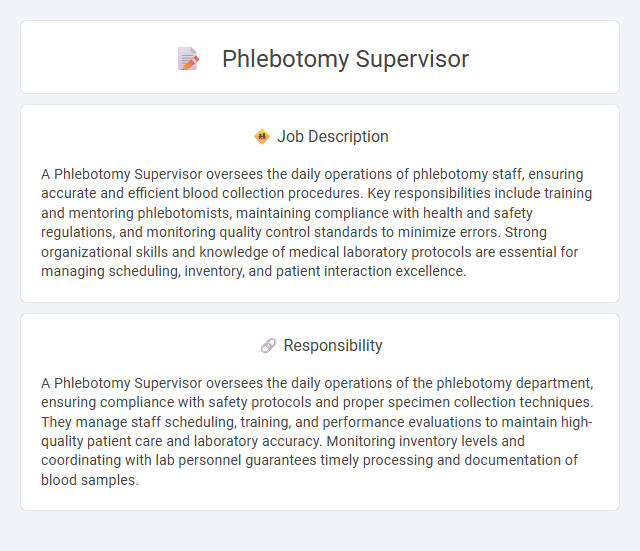
A Phlebotomy Supervisor oversees the daily operations of phlebotomy staff, ensuring accurate and efficient blood collection procedures. Key responsibilities include training and mentoring phlebotomists, maintaining compliance with health and safety regulations, and monitoring quality control standards to minimize errors. Strong organizational skills and knowledge of medical laboratory protocols are essential for managing scheduling, inventory, and patient interaction excellence.
Individuals with strong attention to detail and excellent communication skills will likely be well-suited for a Phlebotomy supervisor role, as the job requires overseeing blood collection processes and managing a team effectively. Those who are comfortable working in fast-paced healthcare environments and have a steady hand may have a higher probability of success in this position. People with empathy and the ability to handle stressful situations calmly are probably better positioned to excel and maintain quality patient care.
Qualification
Phlebotomy supervisor roles require comprehensive expertise in blood collection techniques, strong leadership skills, and proficiency in laboratory information systems. Candidates typically need certification as a phlebotomist (CPT or equivalent), several years of hands-on phlebotomy experience, and experience in staff supervision or management. Knowledge of healthcare regulations, quality control standards, and excellent communication abilities are essential qualifications for success in this position.
Responsibility
A Phlebotomy Supervisor oversees the daily operations of the phlebotomy department, ensuring compliance with safety protocols and proper specimen collection techniques. They manage staff scheduling, training, and performance evaluations to maintain high-quality patient care and laboratory accuracy. Monitoring inventory levels and coordinating with lab personnel guarantees timely processing and documentation of blood samples.
Benefit
Phlebotomy supervisors likely experience benefits such as enhanced career growth opportunities and higher salary potential compared to entry-level positions. They may also enjoy improved job stability and the chance to develop leadership skills within healthcare settings. Access to professional development and training programs could further contribute to their long-term career advancement.
Challenge
The role of a Phlebotomy Supervisor likely involves managing the complexities of coordinating a team while ensuring accurate blood collection and patient safety. Challenges may arise from maintaining high-quality standards under time constraints and handling urgent staffing needs. Effective problem-solving and leadership skills are probably essential to address these demands successfully.
Career Advancement
A Phlebotomy Supervisor role offers significant career advancement by developing leadership skills and managing clinical teams in high-demand healthcare settings. This position provides opportunities to oversee phlebotomy operations, ensure quality control, and implement staff training programs, laying a foundation for roles such as Laboratory Manager or Healthcare Administrator. Mastery in patient care protocols and laboratory technology enhances eligibility for specialized certifications and executive positions within medical diagnostics.
 kuljobs.com
kuljobs.com